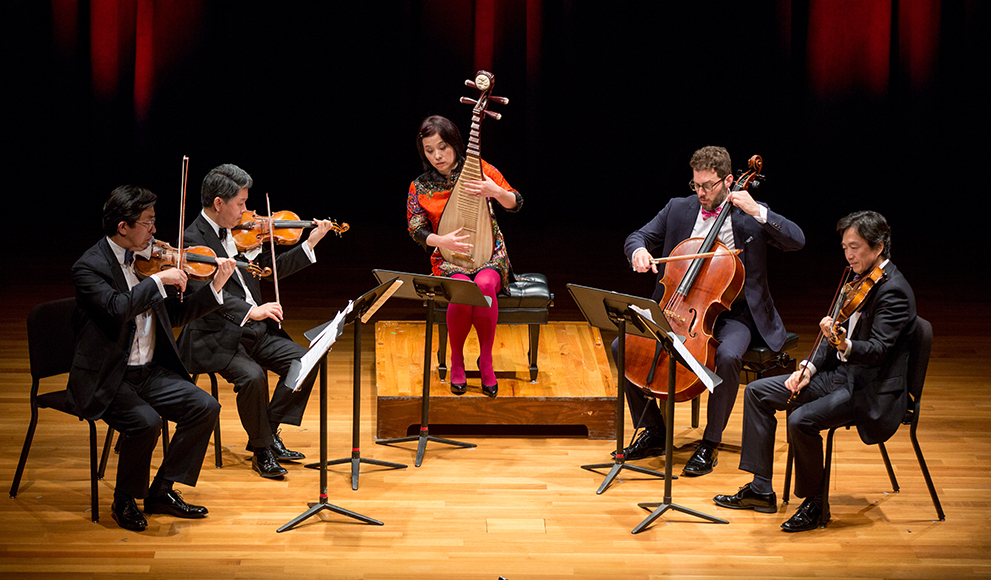Wu Man and the Shanghai Quartet Present Music from Ancient and New China

Grammy Award-nominated global superstar Wu Man is widely recognized as the world’s premier pipa virtuoso. The Shanghai Quartet, renowned for its passionate musicality, impressive technique, and multicultural innovations, is one of the world's foremost chamber music ensembles. The two musical forces will appear together to perform Music from Ancient and New China on Sunday, April 3 at 3pm in the Diana Chapman Walsh Alumnae Hall Auditorium as part of the Wellesley College Concert Series.
Wu Man is an outstanding exponent of the traditional Chinese repertoire as well as a leading interpreter of contemporary pipa music by today's most prominent composers, and she has toured the globe with various orchestras, including Yo-Yo Ma's Silk Road Ensemble. She was awarded the Bunting Fellowship at Harvard University in 1998, and in 2008 was the first Chinese traditional musician to receive the United States Artist Fellowship. She is also the first artist from China to perform at the White House.
Wu Man's discography of more than 40 albums features her expertise with the pipa, an ancient Chinese instrument similar to the lute that dates back to the Qin and Han Dynasties (221 B.C. to 220 A.D.). The pipa is named for the "pi" and "pa" sounds its strings make when they are plucked. In addition to contributing beauty, the pipa has been used in the teaching of Buddhism in early China, as a prominent instrument for female entertainers, called "singsong girls," who played at imperial courts and teahouses, and in more elaborate compositions after the literati (scholar-bureaucrats) began taking an interest in the instrument in the Ming and Qing Dynasties (1368 to 1911).
Wu Man met the musicians of the Shanghai Quartet at the Central Conservatory of Music in Beijing, where she began studying at age 13. (After her audition was covered by national newspapers and she was hailed as a child prodigy, she became a nationally recognized role model for young pipa players.) Wu Man and the Shanghai Quartet's current tour will visit 12 North American cities.
The Shanghai Quartet has a long history of championing new music and juxtaposing Eastern and Western traditions. Its elegant style melds the delicacy of Eastern music with the emotional breadth of Western repertoire, traversing genres including traditional Chinese folk music, masterpieces of Western music, and cutting-edge contemporary works.
Sunday’s concert highlights include a new multimedia work by the eminent Chinese composer Zhao Jiping, in collaboration with his son, Zhao Lin, and the father-son duo’s famous scores from such Chinese films as Raise the Red Lantern, To Live, and Farewell My Concubine. The program also includes a suite of traditional Chinese folk songs arranged by quartet violinist Yi-Wen Jiang as well as solo pipa works by Wu Man.
In addition to the concert with Wu Man, the quartet will take part in a three-day residency at the College that includes a master class, an open rehearsal and informal performance with Wellesley’s string faculty, and class visits with departments such as East Asian Languages and Cultures.
"This residency creates wonderful opportunities for Wellesley music students to gain exposure to world-class artists’ musical expertise and experience," said Eliko Akahori, director of Wellesley's Music Performance Program. "Student chamber music groups will receive firsthand coaching to develop their artistry. In addition, our students, including students with backgrounds in traditional Chinese instruments, will benefit from exposure to a unique combination of Western and Eastern instruments and music."
In addition to the Sunday concert and the Monday informal performance, Wu Man will be on hand on Sunday evening for a Q&A session following the 8pm screening of her documentary, Discovering a Musical Heartland: Wu Man's Return to China. All three events are free and open to the public. Reservations are recommended for Sunday's concert.
Music from Ancient and New China is generously supported by the Expeditions program of the New England Foundation for the Arts, made possible with funding from the National Endowment for the Arts, with additional support from the six New England state arts agencies. It is also funded in part by the Marjorie Copland Baum Memorial Fund and the Florence Jeup Ford '22, Mary M. Crawford '22, and Virginia Ford '48 Artist in Residence Endowment Fund.
